Luxembourg recently served as a crossroads for digital cooperation as telecom regulators from Africa and Europe convened for three weeks of intense peer-to-peer learning within the iPRIS Project. Participants included the National Telecom Authorities (NRAs) of Benin, Democratic Republic of Congo, Burundi, Cameroon, Gabon, Guinea, and Equatorial Guinea, as well as the Regional Regulatory Organisations (RROs) - ARTAO, EACO, ARTAC, and CRASA, and European partners (ARCEP France, BNetzA Germany, IBPT Belgium, and Deloitte). Against a backdrop of rapid digital growth, where affordability, inclusion, and security are pressing, this three-week programme was designed to foster cross-border cooperation and institutional capacity-building, alongside national Change Initiatives.
Despite Africa's digital boom, the latest ITU 2024 figures reveal a significant disparity between the continent and global averages, with 38% of the population online compared to 68% worldwide. While 85% of its population enjoys 3G coverage, the percentage falls to 60% for 4G and a mere 11% for 5G, indicating that infrastructure gaps have been present all along. It's more severe in rural areas, where one in four people are unable to connect to the Internet, and Internet penetration stands at 23% compared to 57% in urban areas. Another divide comes with gender disparities: while 43% of men are online, only 31% of women are, leaving millions of others, especially young girls, at risk of exclusion from the opportunities provided by the digital economy.
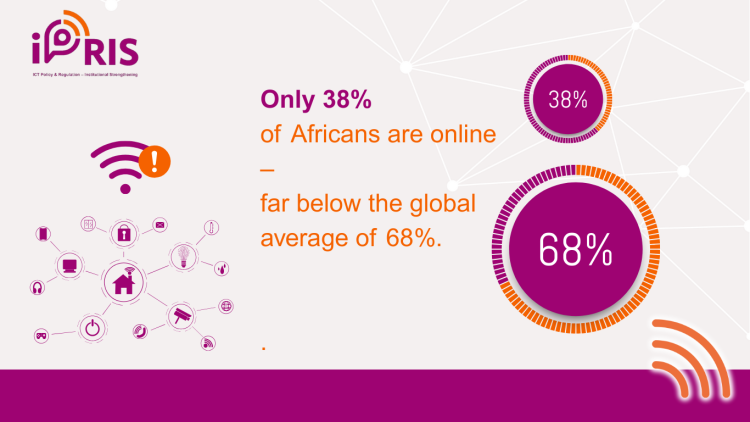
This is the sixth iPRIS cohort (2025C) organised by SPIDER, in collaboration with the Institut luxembourgeois de régulation (Luxembourg Regulatory Institute [ILR]). The sessions covered a wide range of themes, including institutional and legal frameworks, competition in a dynamic market, Diversity, Equity, and Inclusion (DEI), end-user protection, spectrum management, and cybersecurity.
Technical foundations and spectrum strategy
The inaugural day set the tone for three weeks of joint work, grounding the participants in the principles of relevance, inclusivity, and sustainability of the iPRIS approach.
Welcoming the cohort, Luc Tapella, ILR Director, stressed, "initiatives for change must be relevant, inclusive and sustainable," and encouraged regulators to "embrace collaboration, peer-to-peer learning and openness as factors of lasting impacts." Jeanne Pietschmann, from the Luxembourg Ministry of Foreign Affairs, welcomed the participants and emphasised the strong cooperation between Luxembourg institutions and their African partners.
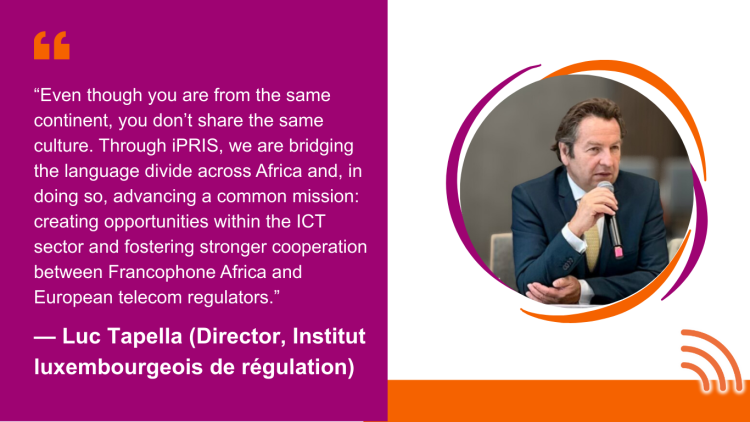
Caroline Wamala Larsson, SPIDER director, pointed out that "digitalisation is a global necessity, not only technically, but also socially and economically," thus framing connectivity as a development driver in all sectors. The afternoon's conclusion featured brief presentations of the Change Initiatives (CIs) being developed by each NRA. CIs are the cornerstone of iPRIS and are strategic projects undertaken to bridge the digital divide by addressing challenges and seizing opportunities in the ICT sector.
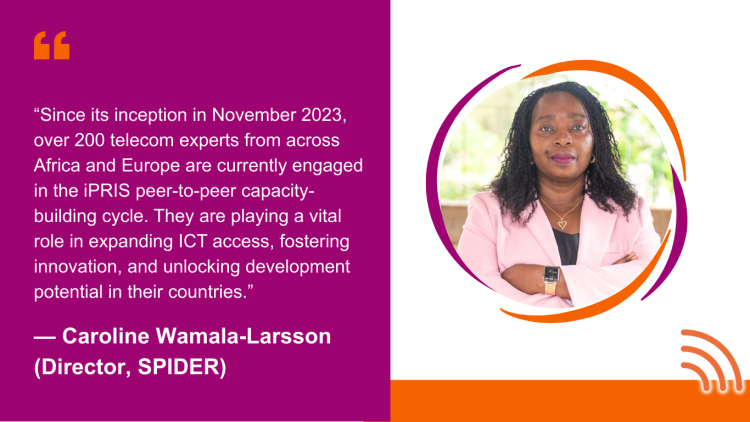
Another session during week 1 featured project management presented by Malena Liedholm-Ndounou, SPIDER expert. Project management is a key capacity that iPRIS is strengthening among NRAs to optimise their CIs. The session highlighted the effectiveness of SMART objectives in project management within the context of change initiatives: Specific, Measurable, Achievable, Relevant, and Time-bound.
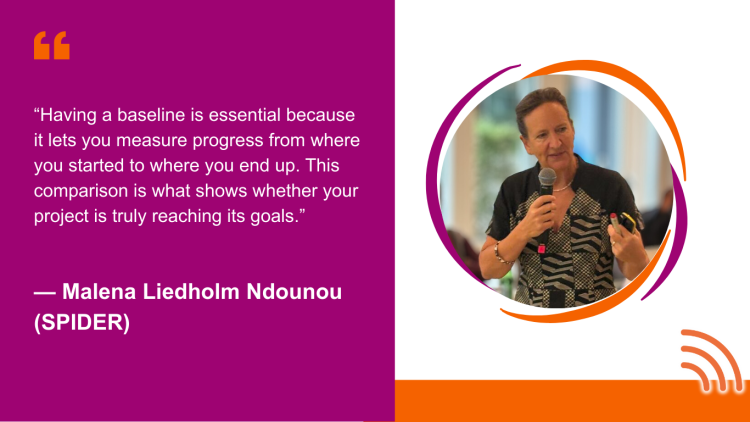
Moreover, a discussion on spectrum management was led by Guy Mahowald, Head of the Frequency Department at ILR. For this session, ARCEP Benin's testimony on the subject of the various national regulations served as a relevant example. Faced with one of the major satellite service providers with a strong presence in sub-Saharan Africa, this Beninese regulator, a central player in the legal and technical reform of the ICT sector, has actively worked to build a sustainable and inclusive digital ecosystem, in particular by drawing inspiration from Nigeria's legislation, and has thus succeeded in supervising new providers in its market through regulation. This relevant testimony from Benin on the subject of regulation testifies to one of the pillars of the Joint European Offer.
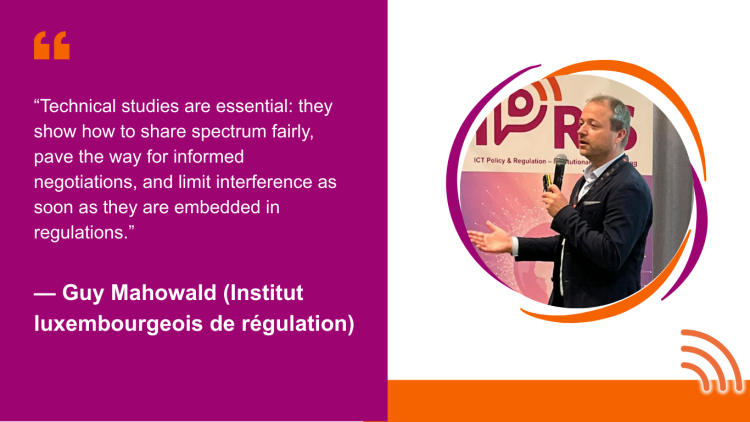
The ICT experts also discussed Luxembourg's regulatory landscape, and ILR was described as a multisector autonomous regulator. Antoine Samba (ARCEP France) and Luc Birgen (ILR) brought perspectives on institutional and regulatory frameworks. Meanwhile, Julien Gilson (ARCEP France) and Annegret Groebel (BNetzA) detailed regulatory and competition models across Europe, examining independence through the clarity of mandates, transparency of procedures, and robustness of governance. Anael Bourrous (Deloitte) introduced the emerging regulatory challenges and the shifting balance of power among global platforms. In contrast, Chaïmae Baghdadi (ARCEP France) discussed the deployment of high-speed networks and the urgent matter of adapting certain provisions of the EU Digital Markets Act to African realities. These interactions highlighted the need to strike a proper balance between market oversight and operational autonomy, while reinforcing national capacities and ensuring that technology serves the interests of all, particularly in terms of gender equity, income-related access, and geographical distribution, thereby keeping technology in the hands of the people.
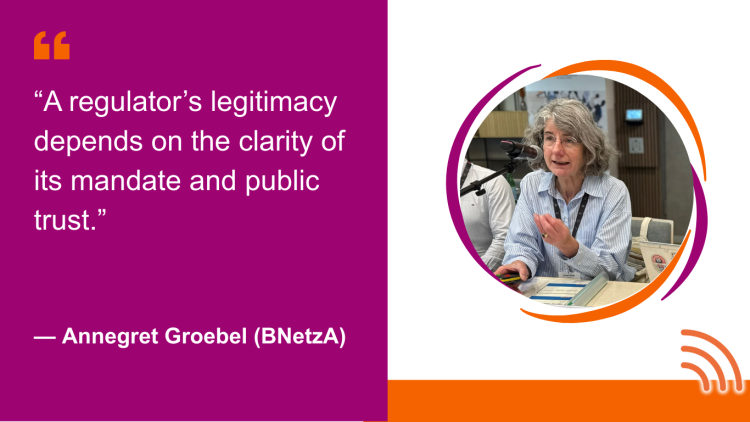
Inclusion, accountability, and the architecture of digital trust
The second week involved more than just technical architectures; it also explored the societal and political underpinnings of digital regulations. Two themes were prominent on Monday morning in sessions led by experts from the SPIDER: Beyond Universal Access in Diversity, Equity and Inclusion (DEI) with Mr Cheikh Sadibou Sakho and Monitoring, Evaluation, Accountability, and Learning (MEAL) with Ms Katja Sarajeva.
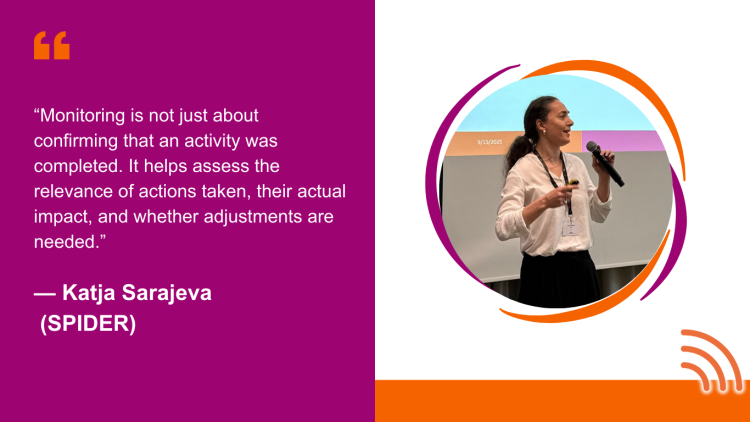
Cheikh Sadibou Sakho highlighted the social dimensions of the digital divide, recalling that inclusion is not limited to infrastructure but also depends on social roles and gender. He highlighted the importance of embedding diversity, equity and inclusion, and introduced the notion of social construction of differences to guide regulators in developing their change initiatives (CIs). Katja Sarajeva, within the framework of MEAL, demonstrated how to place sustainable impact at the centre of actions through accountability, learning loops, and the use of disaggregated data, ensuring real and sustainable change.
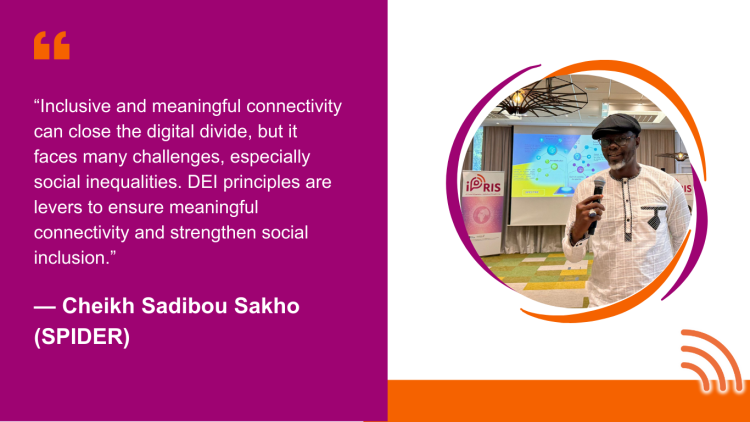
On Tuesday morning, the focus was on a very interactive intervention on cybersecurity and regulation by Ms Asmaa Ouraini from the ILR. Later in the week, the sessions shifted to the strategic management of numbering and addressing, which were conducted by Tom Meyers (ILR) and Richard Klein (IBPT). They emphasised the need for long-term planning and coordination at a global level. With Sophie Steichen and Stefania Salvati (ILR), consumer protection sessions emphasised the importance of transparent contracts with clear indicators, as well as empowering users to utilise practical tools such as service comparers and quality monitors.
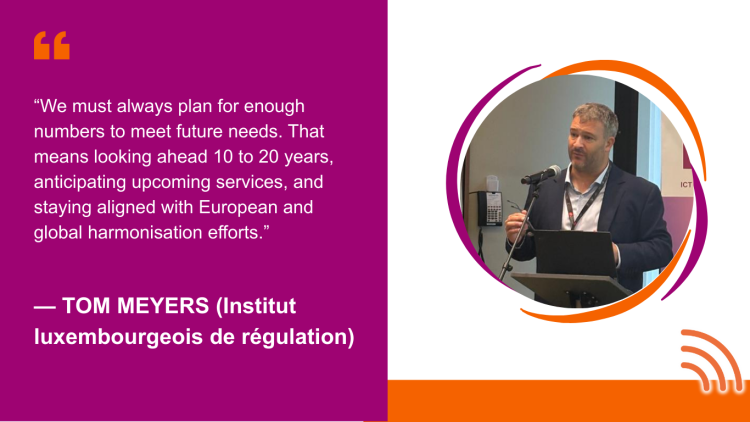
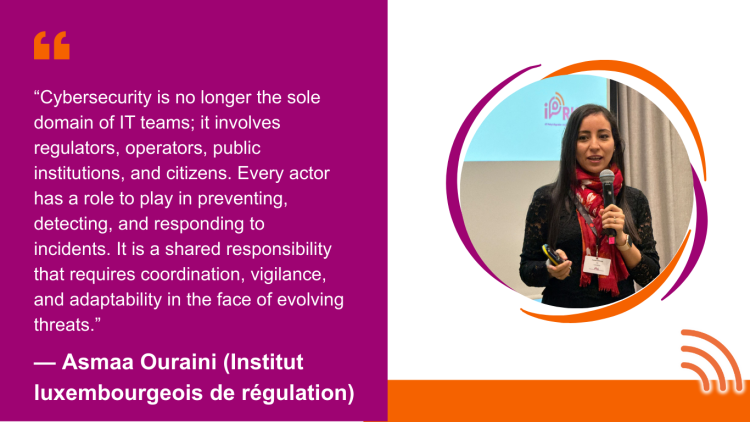
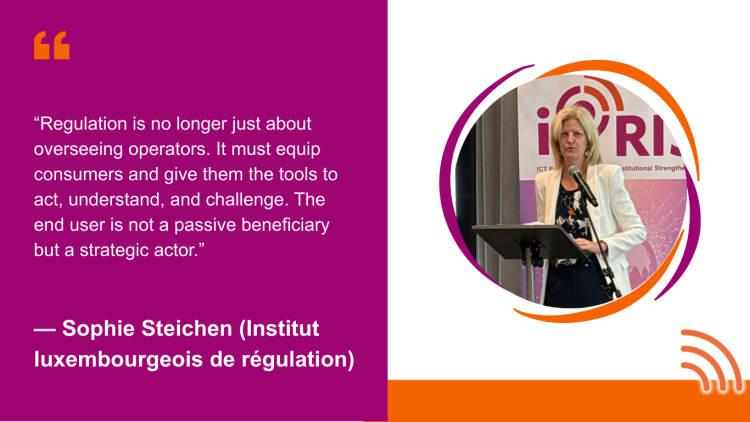
Representatives of four Regional Regulatory Organisations, who had been following the sessions via video conference, joined the delegates in person this week. They included Ms Bernice Edande (ARTAC), Mr Ruffus Samuel (ARTAO), Mr Alexis Sinarinzi (EACO) and Mr Trilok Dabeesing (ICTA/CRASA). Their simultaneous participation, a first, was a major step towards enhanced cooperation on a continental scale.
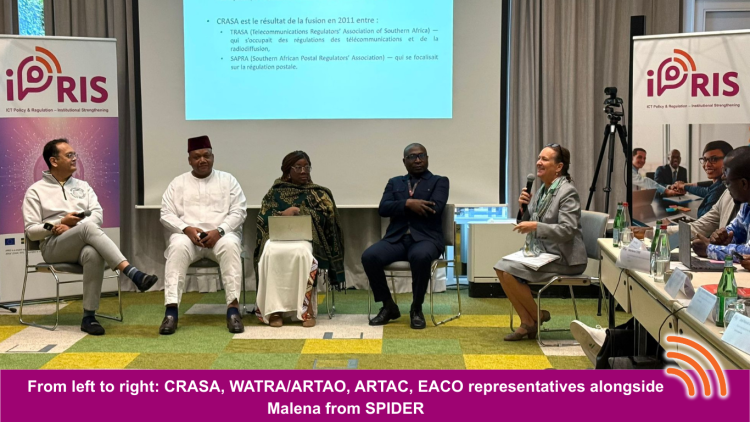
Alongside these discussions, site visits to SES and Luxembourg’s National Museum of Archaeology, History and Art highlighted the broader context of digital transformation, blending technical learning with cultural exchange and strengthening peer networks across Africa and Europe.
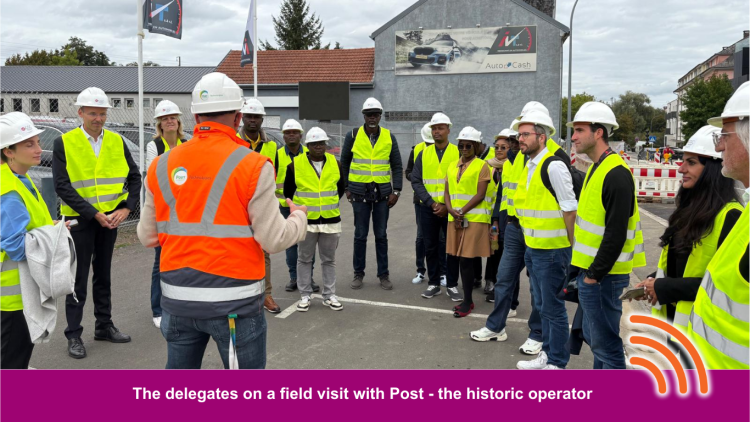
From planning to action: Refining change initiatives
In the last week, everything from the 3-week course came full circle as participants aimed to flesh out the CIs that will present their plans to the NRA for the next year. The early sessions focused on addressing and numbering challenges in underserved rural areas, while also considering the broader issues of equity and resource allocation. The discussion on inclusive data and representation, led by Sadibou Sakho (SPIDER), underscored that analysis must be gender-disaggregated because dominant voices tend to mask the needs of women and other marginalised groups.
Working groups, in turn, applied these lessons to the CIs by strengthening governance structures, clarifying benchmarks, and adjusting international models to fit national realities. Expert feedback from SPIDER, ILR, and RROs further strengthened the teams' capacity-building proposals by identifying potential actors who could implement activities and proposing a timeline within which these activities logically fit.
The final moment of the round took place during the "Way Forward" sessions, during which the NRAs presented their project plans. The presentations demonstrated how each Change Initiative evolves from peer exchange, project management workshops, and diversity and inclusion sessions to deliver real regulatory change within the upcoming year.
Former iPRIS cohorts and ITP alumni joined this session remotely to provide comments and suggestions and to connect these new projects to ongoing reforms throughout Africa, further reinforcing iPRIS as a living collaboration network. The extremely rigorous feedback emphasised the importance of proper governance, communication, and adaptation to context, while also praising the cohort's ability to turn complex bottlenecks into concrete strategies.
A shared commitment to inclusive digital futures
The 2025C round ended with a sobering reminder that any regulation is both technical and socio-political. In a span of three weeks, the African and European telecom experts marched from the essentials of spectrum strategies into greater details on social imperatives of equity, accountability, and user protection, ultimately airing Change Initiatives that will firm up the reforms long after the peer exchanges.
The journey demonstrated that cross-continental collaboration is effective: European models provided benchmarks, while African realities introduced new perspectives on affordability, gender gaps, and rural connectivity. The peer learning process, significant feedback, and cultural exchange activities (field visits and informal discussions) helped forge the kind of trust necessary to take these ideas forward to action.
Watch highlights from this cohort's time in Luxembourg below
iPRIS is coordinated and implemented by SPIDER in strategic and technical partnership with the Swedish Post and Telecom Authority (PTS) and Institut luxembourgeois de régulation (ILR), as well as ARTAC, CRASA, EACO, and WATRA.
iPRIS is funded by the European Union, Sweden, and Luxembourg as part of the Team Europe Initiative “D4D for Digital Economy and Society in Sub-Saharan Africa” (Code: 001).





